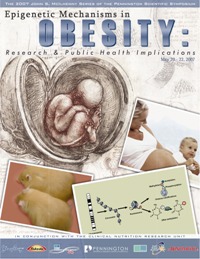Scientific Symposia Series
The 2007 John S. McIlhenny Series of the Pennington Scientific Symposium: Epigenetic Mechanisms in Obesity: Research & Public Health Implications
 5/20/2007 - 5/23/2007
5/20/2007 - 5/23/2007
Co-chairs:
Kenneth Eilertsen, Ph.D., Nuclear Reprogramming and Epigenetics, Pennington Biomedical
Research Center
David Barker, Ph.D., M.D., Clinical Epidemiology, Oregon Health and Science University
Rob Waterland, Ph.D., Departments of Pediatrics and Molecular and Human Genetics Baylor
College of Medicine, Children's Nutrition Research Center
Program Description:
The goal of this symposium is to review key mechanisms leading to developmental and
nutritional programming of obesity and related chronic disease such as type2 diabetes
and hypertension. A key goal will be to review and discuss the likelihood that epigenetic-based
changes contribute to the early establishment of a predisposition to later in life
disease.
This symposium will be an update on the current scientific knowledge on the role of
environmental factors with emphasis on nutrition in utero and post natal and its impact on chronic diseases. We aim at fostering new collaborations
between interested scientists and potentially industry to stimulate additional research
in the emerging field of nutritional programming. Such research may lead to novel
interventional strategies to slow down the galloping increase in the prevalence of
obesity and its associated cardiometabolic risks.
Objectives:
1. To increase participants knowledge of developmental and nutritional programming
of obesity and related chronic diseases;
2. To enhance the knowledge of epigenetic mechanisms contributing to the programming
of obesity and related chronic diseases;
3. To increase the knowledge of analytical approaches to assess epigenetic-based mechanisms
contributing to the programming of obesity and chronic disease.
Background:
Human epidemiological studies and dietary interventions in animal models hav suggested
that maternal nutritional imbalance and metabolic disturbances during critical time
periods of development may have long term health consequences on offspring. It is
now necessary to identify and explain the mechanisms inducing these responses. There
is growing acceptance of the notion that epigenetic changes associated with chromatin
structure and regulation of gene expression provide a basis to contribute to developmental
programming and establishment of predispositions to later in life chronic disease.
This suggests new possibilities for the prevention and treatment of obesity and related
chronic diseases.
The Scientific Symposia Series was established in 2002 to attract world-renowned scientists
to the Pennington Biomedical Research Center , to allow them the opportunity to interact
and synthesize knowledge in selected areas of nutrition and preventive medicine research.
Scientific Symposia are coordinated by the Division of Education at the Pennington
Biomedical Research Center in conjunction with funding provided by the Pennington
Foundation and other private resources. The Pennington Biomedical Research Foundation
provides Pennington Biomedical Research Center with vital funding for this education
series as well as for nutrition-based research that aims to curb the epidemic of obesity
and prevent premature death from chronic diseases.


